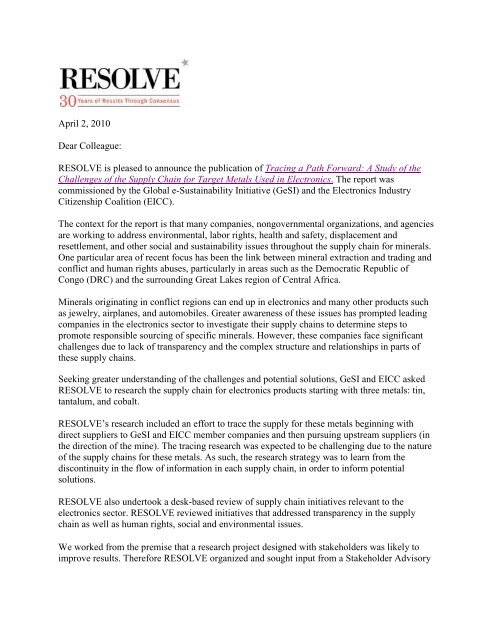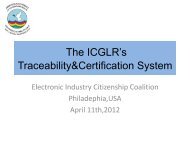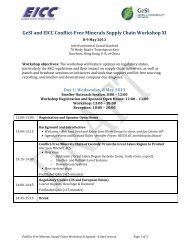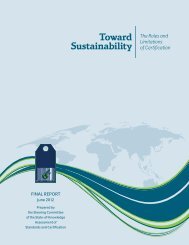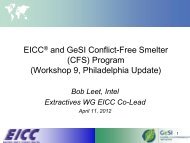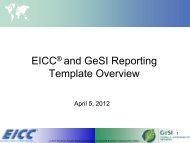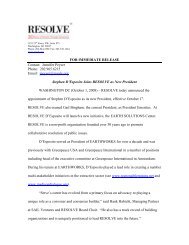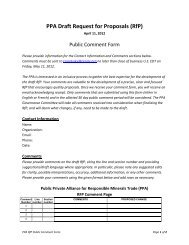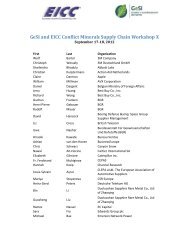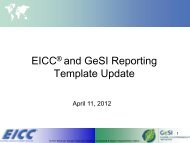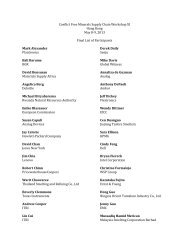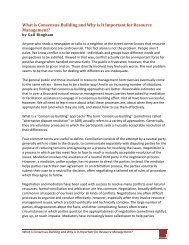Tracing a Path Forward: A Study of the Challenges of - Resolve
Tracing a Path Forward: A Study of the Challenges of - Resolve
Tracing a Path Forward: A Study of the Challenges of - Resolve
You also want an ePaper? Increase the reach of your titles
YUMPU automatically turns print PDFs into web optimized ePapers that Google loves.
April 2, 2010<br />
Dear Colleague:<br />
RESOLVE is pleased to announce <strong>the</strong> publication <strong>of</strong> <strong>Tracing</strong> a <strong>Path</strong> <strong>Forward</strong>: A <strong>Study</strong> <strong>of</strong> <strong>the</strong><br />
<strong>Challenges</strong> <strong>of</strong> <strong>the</strong> Supply Chain for Target Metals Used in Electronics. The report was<br />
commissioned by <strong>the</strong> Global e-Sustainability Initiative (GeSI) and <strong>the</strong> Electronics Industry<br />
Citizenship Coalition (EICC).<br />
The context for <strong>the</strong> report is that many companies, nongovernmental organizations, and agencies<br />
are working to address environmental, labor rights, health and safety, displacement and<br />
resettlement, and o<strong>the</strong>r social and sustainability issues throughout <strong>the</strong> supply chain for minerals.<br />
One particular area <strong>of</strong> recent focus has been <strong>the</strong> link between mineral extraction and trading and<br />
conflict and human rights abuses, particularly in areas such as <strong>the</strong> Democratic Republic <strong>of</strong><br />
Congo (DRC) and <strong>the</strong> surrounding Great Lakes region <strong>of</strong> Central Africa.<br />
Minerals originating in conflict regions can end up in electronics and many o<strong>the</strong>r products such<br />
as jewelry, airplanes, and automobiles. Greater awareness <strong>of</strong> <strong>the</strong>se issues has prompted leading<br />
companies in <strong>the</strong> electronics sector to investigate <strong>the</strong>ir supply chains to determine steps to<br />
promote responsible sourcing <strong>of</strong> specific minerals. However, <strong>the</strong>se companies face significant<br />
challenges due to lack <strong>of</strong> transparency and <strong>the</strong> complex structure and relationships in parts <strong>of</strong><br />
<strong>the</strong>se supply chains.<br />
Seeking greater understanding <strong>of</strong> <strong>the</strong> challenges and potential solutions, GeSI and EICC asked<br />
RESOLVE to research <strong>the</strong> supply chain for electronics products starting with three metals: tin,<br />
tantalum, and cobalt.<br />
RESOLVE’s research included an effort to trace <strong>the</strong> supply for <strong>the</strong>se metals beginning with<br />
direct suppliers to GeSI and EICC member companies and <strong>the</strong>n pursuing upstream suppliers (in<br />
<strong>the</strong> direction <strong>of</strong> <strong>the</strong> mine). The tracing research was expected to be challenging due to <strong>the</strong> nature<br />
<strong>of</strong> <strong>the</strong> supply chains for <strong>the</strong>se metals. As such, <strong>the</strong> research strategy was to learn from <strong>the</strong><br />
discontinuity in <strong>the</strong> flow <strong>of</strong> information in each supply chain, in order to inform potential<br />
solutions.<br />
RESOLVE also undertook a desk-based review <strong>of</strong> supply chain initiatives relevant to <strong>the</strong><br />
electronics sector. RESOLVE reviewed initiatives that addressed transparency in <strong>the</strong> supply<br />
chain as well as human rights, social and environmental issues.<br />
We worked from <strong>the</strong> premise that a research project designed with stakeholders was likely to<br />
improve results. Therefore RESOLVE organized and sought input from a Stakeholder Advisory
Group <strong>of</strong> diverse organizations including GeSI and EICC members, international and local<br />
NGOs, mining companies, investors, and trade associations.<br />
Our findings highlight <strong>the</strong> challenges that result from <strong>the</strong> complex nature <strong>of</strong> minerals processing,<br />
<strong>the</strong> informality <strong>of</strong> <strong>the</strong> sector in some instances, and <strong>the</strong> complexity and composition <strong>of</strong> most<br />
electronics products. These products typically contain a variety <strong>of</strong> metals as part <strong>of</strong> numerous<br />
subcomponents. Minerals in each subcomponent can <strong>the</strong>n originate from multiple sources. The<br />
supply chain, as it existed at <strong>the</strong> start <strong>of</strong> our research, was not organized to provide any degree <strong>of</strong><br />
assurance as to minerals source, much less <strong>the</strong> conditions at <strong>the</strong> source.<br />
Our research also yielded both cooperation from companies in <strong>the</strong> supply chain and significant<br />
non-cooperation. Interestingly, while we were only able to establish supply chain relationships<br />
through tracing (from product to mine) in four fairly limited cases, <strong>the</strong>re is now a correlation<br />
between those who cooperated in our study and those who are working actively with GeSI and<br />
EICC members, and o<strong>the</strong>r stakeholders, to explore and design news systems to enhance supply<br />
chain transparency. This conforms to our finding that alterations in current supply chain<br />
relationships and systems will be needed to promote transparency.<br />
Our research also shows that progress will likely happen in a stepwise fashion and require testing<br />
new approaches, particularly with regard to sources from regions in or near conflict zones. Based<br />
on lessons from this supply chain research and <strong>the</strong> desk study <strong>of</strong> related initiatives, <strong>the</strong> following<br />
is useful guidance:<br />
Explore multi-industry approaches and efficiencies: As many industries share common<br />
metals supply chains and challenges, end-use companies and suppliers from multiple sectors<br />
can achieve efficiencies by working across industry sectors to explore and design solutions.<br />
There is value in multi-stakeholder collaboration: To achieve credible systems and utilize<br />
local information sources and on-<strong>the</strong>-ground capacity (especially in regions <strong>of</strong> conflict),<br />
active engagement and consultation with nongovernmental organizations and international<br />
and local governments from <strong>the</strong> earliest stages <strong>of</strong> design to testing can be beneficial. Through<br />
<strong>the</strong> multi-stakeholder advisory group we are aware <strong>of</strong> this capacity and interest on <strong>the</strong> part <strong>of</strong><br />
numerous stakeholders.<br />
Tackling complex challenges on multiple levels can yield results. For example, for <strong>the</strong>se<br />
metals a two-track approach <strong>of</strong> smelter-based certification plus in-region pilots could be<br />
beneficial. For both gold and diamonds, we found evidence that both validation systems<br />
targeting supply chain actors and community-based projects supporting source development<br />
are beneficial.<br />
As we complete our work on this report, a number <strong>of</strong> <strong>the</strong>se recommendations are already being<br />
considered, including exploration <strong>of</strong> smelter validation and a trial, or pilot, to identify<br />
responsible, localized sources from commercial and small-scale mining sites in <strong>the</strong> Great Lakes<br />
region <strong>of</strong> Central Africa.<br />
Moving forward, <strong>the</strong>re could be significant value in linking some related initiatives in an effort to<br />
focus and maximize <strong>the</strong> impact <strong>of</strong> available resources; this research consistently highlighted <strong>the</strong>
need for, and an interest in, a coordinated effort to integrate civil society, government and<br />
industry efforts. RESOLVE is hopeful that this analysis, combined with lessons from research<br />
undertaken by o<strong>the</strong>r organizations, can provide information and impetus for stakeholders to<br />
jointly define activities and identify solutions to conflict and environmental and social issues.<br />
We appreciate that <strong>the</strong> many social, environmental, political, economic, and o<strong>the</strong>r issues <strong>of</strong><br />
interest surrounding <strong>the</strong> metals supply chain continue to evolve, as does our joint understanding<br />
<strong>of</strong> <strong>the</strong>se factors. This report represents a snapshot <strong>of</strong> what we have learned to date, as well as an<br />
effort to understand and balance <strong>the</strong> many perspectives and observations we have come across in<br />
<strong>the</strong> course <strong>of</strong> our research. The report can be downloaded, along with additional supporting<br />
documents, past interim reports, and o<strong>the</strong>r background information at RESOLVE’s project wiki.<br />
We are also discussing this report online at www.resolvblog.blogspot.com and encourage you to<br />
join <strong>the</strong> conversation.<br />
We welcome your feedback on this report.<br />
Sincerely,<br />
Jen Peyser<br />
RESOLVE<br />
ABOUT RESOLVE<br />
RESOLVE builds strong, enduring solutions to environmental, social, and health challenges. We<br />
help community, business, government, and social leaders get results and build lasting<br />
relationships through collaboration. RESOLVE is an independent non-pr<strong>of</strong>it organization<br />
founded in 1977, RESOLVE’s services and programs are designed to help parties engage in factfinding,<br />
information sharing, dialogue, decision making, solutions discovery, and action. Jen<br />
Peyser led <strong>the</strong> project for RESOLVE, with support from Steve D’Esposito and Jason<br />
Gershowitz. For more information on RESOLVE, please see www.resolv.org. Jen Peyser can be<br />
reached at jpeyser@resolv.org or +1 202 965 6215.<br />
ABOUT GeSI and EICC<br />
The Electronic Industry Citizenship Coalition (EICC) is a group <strong>of</strong> companies working toge<strong>the</strong>r<br />
to create a comprehensive set <strong>of</strong> tools and methods that support credible implementation <strong>of</strong> <strong>the</strong><br />
Code <strong>of</strong> Conduct throughout <strong>the</strong> Electronics and Information and Communications Technology<br />
(ICT) supply chain.<br />
The Global e-Sustainability Initiative (GeSI) is a global partnership <strong>of</strong> ICT companies that<br />
promotes technologies for a sustainable development.
The mission <strong>of</strong> <strong>the</strong> GeSI/EICC Extractives Workgroup is to positively influence <strong>the</strong> social and<br />
environmental conditions in <strong>the</strong> metals extractives supply chain as it connects to <strong>the</strong> EICC/GeSI<br />
member companies by supporting transparency while continuing to investigate additional<br />
opportunities. The EICC (www.eicc.info) and GeSI (www.gesi.org) membership represent a<br />
large proportion <strong>of</strong> companies in <strong>the</strong> electronics sector.


